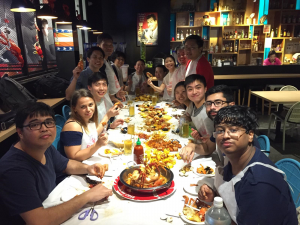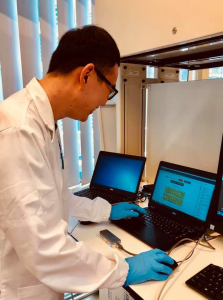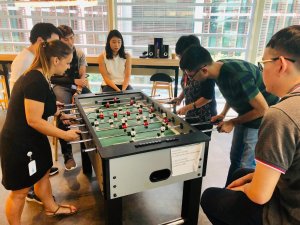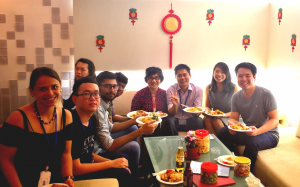A final year Biomedical Science (BM) student at IMU, Chok Kian Chung from BM1/16 had the opportunity to undergo his Phase 1 internship at A*STAR, Singapore. Kian Chung recalled ‘As a BM student, we need to undergo two phases of internship – Phase I for a research internship while Phase II for internship in a diagnostic laboratory. As I am eager to work in Singapore after my graduation, thus, I thought doing my internship in Singapore would be a great start and A*STAR, which is a well-established research institute with many talents, technologies and resources was my first choice”. 
 “Since young, I have always found genetic subjects to be tough as it requires imagination to understand every abstract theory and practice in the field. However, the increasing attention in genetics therapy and growth of genetic modification tools – CRISPR-Cas have sparked my interest in genetics research and I am eager to sate my curiosity. Fortunately, I had the opportunity to have my practical attachment in Genome Institute of Singapore (GIS), Agency for Science, Technology and Research (A*STAR) in Singapore under the supervision of Dr Chew Wei Leong. It was an eye-opening journey as there are multi-talented colleagues with a variety of expertise contributing to genetic therapy research in their own way”. “Dr Chew practices ‘happy lab’ concept as everyone in the lab is equal and has his or her own projects to work on. Even as an intern, I was given the opportunity to design and conduct a research based on my interest. I am glad to have the guidance from Dr Eddie Keng Choong Tat, a post-doc, to work on directed evolution of adeno-associated virus (AAV). Genetic modification is having limitation on delivery of therapeutics into targeted tissues or organs as present AAVs are low specific and induce unwanted immune response. My work was mainly working on design of virus capsid to produce high-specificity and efficiency virus serotypes to enable tissue-specific genetic therapy”.
“Since young, I have always found genetic subjects to be tough as it requires imagination to understand every abstract theory and practice in the field. However, the increasing attention in genetics therapy and growth of genetic modification tools – CRISPR-Cas have sparked my interest in genetics research and I am eager to sate my curiosity. Fortunately, I had the opportunity to have my practical attachment in Genome Institute of Singapore (GIS), Agency for Science, Technology and Research (A*STAR) in Singapore under the supervision of Dr Chew Wei Leong. It was an eye-opening journey as there are multi-talented colleagues with a variety of expertise contributing to genetic therapy research in their own way”. “Dr Chew practices ‘happy lab’ concept as everyone in the lab is equal and has his or her own projects to work on. Even as an intern, I was given the opportunity to design and conduct a research based on my interest. I am glad to have the guidance from Dr Eddie Keng Choong Tat, a post-doc, to work on directed evolution of adeno-associated virus (AAV). Genetic modification is having limitation on delivery of therapeutics into targeted tissues or organs as present AAVs are low specific and induce unwanted immune response. My work was mainly working on design of virus capsid to produce high-specificity and efficiency virus serotypes to enable tissue-specific genetic therapy”.  Kian Chung remarked “Throughout the internship, I have learnt cloning, cell culture, virus production, Oxford Nanopore sequencing, etc. I also have the chance to work on the organoid culture, but due to time constraint and the breakdown of the equipment, I could only learn the very basic aspect of it. Honestly, as someone who is passionate about research, I felt that the three months of internship is way too short. How I wish I could be in the lab for longer duration”.
Kian Chung remarked “Throughout the internship, I have learnt cloning, cell culture, virus production, Oxford Nanopore sequencing, etc. I also have the chance to work on the organoid culture, but due to time constraint and the breakdown of the equipment, I could only learn the very basic aspect of it. Honestly, as someone who is passionate about research, I felt that the three months of internship is way too short. How I wish I could be in the lab for longer duration”.  Overall, Kian Chung felt that he has a very fruitful internship in enhancing both his laboratory skills and knowledge as well as his interpersonal skills. “I had a joyful experience in the lab as my colleagues are friendly and the lab has a harmonious environment. Even though my colleagues are helpful and willing to guide, self-learning is expected and important in the lab. Other than that, I have met colleagues who have inspired me in science and in life. To succeed in science is not just working hard in the lab, but is also on having great insight, beliefs and work-life balance”.
Overall, Kian Chung felt that he has a very fruitful internship in enhancing both his laboratory skills and knowledge as well as his interpersonal skills. “I had a joyful experience in the lab as my colleagues are friendly and the lab has a harmonious environment. Even though my colleagues are helpful and willing to guide, self-learning is expected and important in the lab. Other than that, I have met colleagues who have inspired me in science and in life. To succeed in science is not just working hard in the lab, but is also on having great insight, beliefs and work-life balance”.
“IMU Biomedical Science Programme has provided me with strong fundamental knowledge and skills while the internship is the opportunity to apply the knowledge and skill I have learnt during classes. I have realised that passive learning is impracticable, especially in the research field. My advice to those would like to pursue further in research: actively seeking for learning opportunities and being able to learn and work independently are the essential skill sets”.
Written by: Chok Kian Chung Photo credit: Chok Kian Chung


No approved comments.